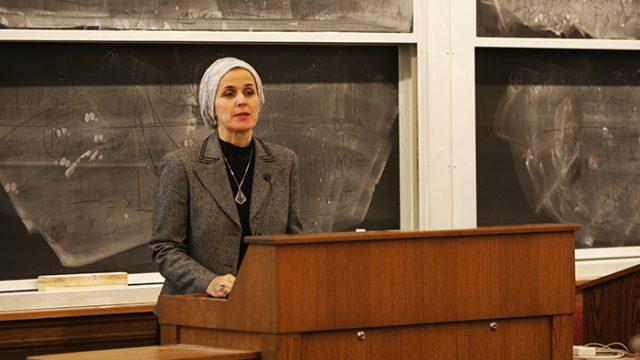Zilka Spahić-Šiljak, a research scholar and human rights activist, spoke to students about the importance of peace building, coexistence, and reconciliation on Thursday. She examined how these can be achieved through educating people on both secular and religious beliefs.
Spahić-Šiljak stressed the importance of people being able to feel that they can create change and have an impact. She discussed how global challenges create feelings of hopelessness and discourage people from taking action within communities. She believes, however, that even the smallest actions can help.
“Believers feel that it’s worth investing in peace despite all the challenges,” she said.
Historically, during conflicts in the Balkans, churches have remained silent because they either support the war criminals or the ethnic divisions. After wars, the human rights activism that follows normally holds no connection with religion, according to Spahić-Šiljak.
She addressed the lack of religion found in activism throughout her lecture. She explained that rather than leaving religion out of the conversation, one can use religion to bring people together.
“Faith has driven many activists in Bosnia to work on linking believers from various religious institutions, but also non-believers who share similar ideas and concerns for the social well being in their communities,” Spahić-Šiljak said.
Different religions have different beliefs and ideas, but that does not mean one should disregard another religion simply because it is different, she said. She believes it is necessary to teach others to understand other religions and to be able to work with them.
Spahić-Šiljak touched on two faith-based programs, hoping to facilitate conversations between religions about achieving social well-being. Both these programs revolve around the idea of relational dialogism, which focuses on bringing attention to the lack of understanding among different religions and how that affects politics and these other global issues.
“It’s the framework which opens the possibility for understanding religion and politics not as two separate spheres and completely divided, but as two spheres that constantly change, shift, and impact each other,” she said.
“It’s the framework which opens the possibility for understanding religion and politics not as two separate spheres and completely divided, but as two spheres that constantly change, shift, and impact each other.”
—Zilka Spahić-Šiljak, a research scholar and human rights activist
One of the faith-based programs Spahić-Šiljak discussed was Three Monotheistic Voices in a Secular Context. The goal of this program is to bring together both believers and nonbelievers of the three Abrahamic religions. It focuses on the religious teachings of love, respect, compassion, and justice, as well as building strong ties with neighbors, which is specifically important in the Bosnian communities.
By educating and bringing people together through these explanations of the main monotheistic voices that are present in religion today, Spahić-Šiljak believes the people will form closer bonds and relate more to each other.
“The Three Monotheistic Traditions can play a beautiful symphony together, and the best and safest space is the secular arena which enables believers and non-believers to come together and celebrate the beauty of coexistence,” she said.
The second program Spahić-Šiljak discussed was the Life Program of Learning for Ethical Values run by the Transcultural Psycho-Educational (TPO) Foundation. The idea behind this is to start educating children early on to teach them that while all religions are different, they are still equal.
Most religions portray theirs as the only truth, yet it is important others understand the ideas behind different religions, Spahić-Šiljak said. In the Balkans, most communities are religiously homogenous, and the people aren’t being introduced to other religions or the idea of no religion.
Five years ago, the TPO Foundation created the Global Ethics in School project in Bosnia to fix this issue. The Global Ethics in School Project focuses on educating schoolchildren about different religious and nonreligious views. It brings together teachers and students and connects them through the idea of learning more about foreign ideas and beliefs.
“TPO attempts to bridge the gap between secular religious divides and secular faith communities, and connect not only different perspectives, but also people who otherwise wouldn’t collaborate,” Spahić-Šiljak said.
Most public schools in the Balkans are structured around one religion. The TPO Foundation works to create conversations in the classroom that goes beyond simply one religious view. The ability to understand other views is the first step to facilitating the past problems between communities, Spahić-Šiljak said.
“It tends to remind ethnically divided people that they have lost and forgotten something that can help them to heal wounds, establish communication again in their communities, and improve understanding and respect,” she said.
The TPO Foundation supports four pillars of global ethics: culture of peace and common life, culture of solidarity and just economic order, culture of tolerance and truthfulness, and culture of equality and partnership between men and women. The Foundation hopes to educate students and teachers and to promote strong values.
“Neither secularism or religion has a recipe for every problem, and since they both serve people and care for their well-being, they can fulfill their mission only if they collaborate and work together without diminishing and undermining each other’s role,” Spahić-Šiljak said.
Featured Image by Isabelle Lumb / Heights Staff














Stupid Atheist • Nov 7, 2016 at 9:56 am
“…one can use religion to bring people together…”
Perhaps Sister Spahić-Šiljak might bring this message to the Gaza strip, or Northern Ireland, or Pakistan, or Somolia, or any of the other myriad of unstable locales worldwide where the devout are laboring in earnest to murder one another in the name of their respective faiths…
Synoptic12 • Nov 7, 2016 at 12:44 am
The face of vengeance is divinely real.